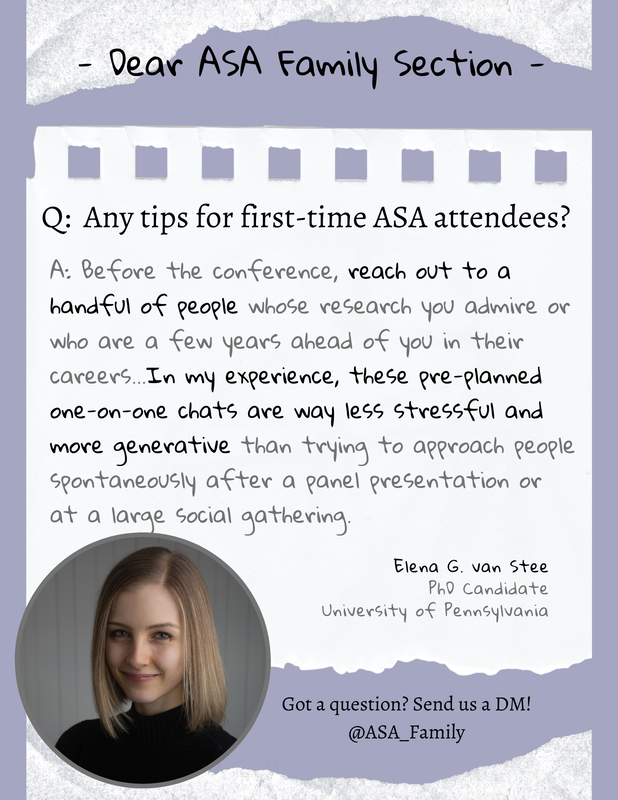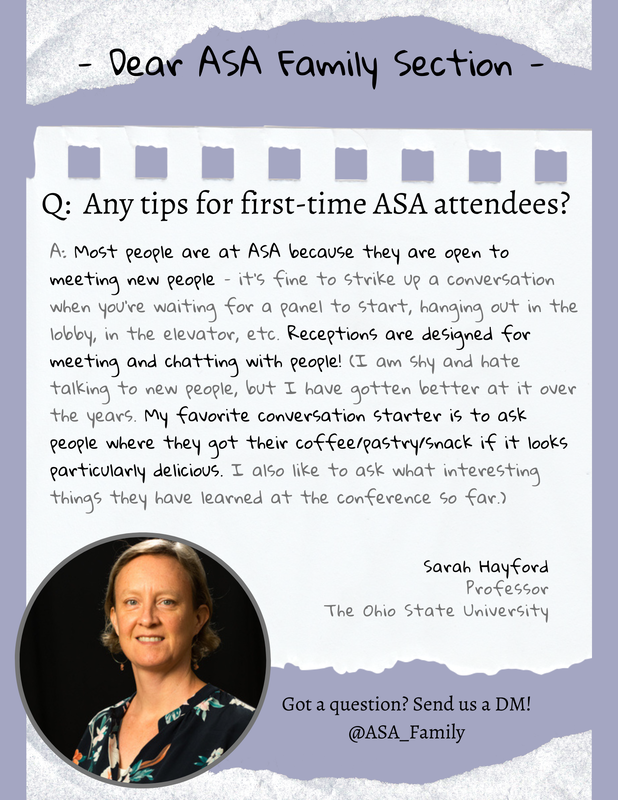|
This post is part of a new series from the Mentoring & Inclusion Committee called Dear ASA Family Section. It's a Dear Abby style Q+A where more advanced family sociologists answer questions from members. Q: Navigating the ASA Conference: How should I approach networking during the conference? Do you have any tips for first-time attendees? A: Here’s one tip: Before the conference, reach out to a handful of people whose research you admire or who are a few years ahead of you in their careers and see if they'd be interested in meeting for coffee or connecting at a section reception. In my experience, these pre-planned one-on-one chats are way less stressful and more generative than trying to approach people spontaneously after a panel presentation or at a large social gathering. With some good luck, you’ll also make serendipitous connections at the conference. But you don’t want to solely depend on luck! Elena G. van Stee PhD Candidate University of Pennsylvania A: Navigating panels:
1. Don’t try to go to everything! You can only fit so many panels into a day. 2. Some people try to go to multiple panels in the same time slot to see specific papers – I’ve never been able to pull this off, people always get off schedule, so I recommend picking one panel and sticking to it. 3. I try to go to a mix of topics I know well and topics that are out of my expertise – a panel at ASA is a good low-commitment way to find out what is going on in other fields or learn about new methods/datasets that you aren’t familiar with. Meeting people at a conference (I really hate the word “networking”): 1. You might have a specific person you want to ask a specific question of at ASA – for these kinds of questions, it’s good to plan in advance. Send an email ahead of the conference to set up a time to talk. (The more senior/well known a person is, the busier they are likely to be, unfortunately, but it never hurts to ask, and people may be willing to email or meet outside of the conference even if they’re not available at ASA.) 2. Or, you might want to meet people just to get to know what others are working on or to have people to exchange ideas with. To me, these are the most valuable kinds of interactions at a conference. For these conversations, I think people at a similar career stage are likely to be most receptive (and also most useful). This is especially true for graduate students – making friends with other students is fun, and other students will be your long-term colleagues in the field, so these are great connections to make. 3. Most people are at ASA because they are open to meeting new people – it’s fine to strike up a conversation when you’re waiting for a panel to start, hanging out in the lobby, in the elevator, etc. Receptions are designed for meeting and chatting with people! (I am shy and hate talking to new people, but I have gotten better at it over the years. My favorite conversation starter is to ask people where they got their coffee/pastry/snack if it looks particularly delicious. I also like to ask what interesting things they have learned at the conference so far.) Sarah Hayford Professor, Director of the Institute for Population Research The Ohio State University
0 Comments
Leave a Reply. |
|

